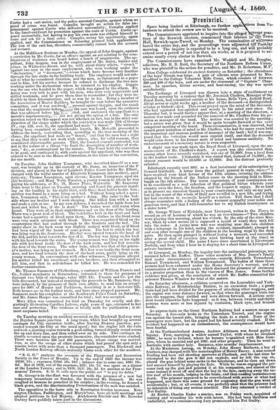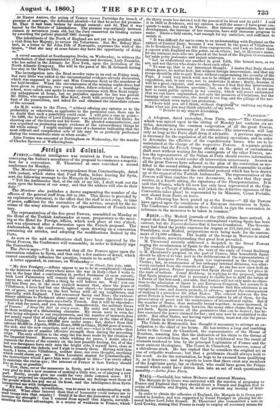Vroultrial.
tions from Vo- Space being limited at Edinburgh, no further applic ltinteers to attend the review are to be received The Commissioners appointed to inquire into the alleged orrupt_prac- * tices of the Berwick electors commenced their labours in e Town
Hall, Berwick-upon-Tweed, on Monday. The examination of eases lasted the entire day, and the proceedings were adjourned tiff-Tuegay morning. The inquiry is expected to be a long one, and will -probably extend over a period of not less than six weeks, as it is proposed to ex- amine nearly every elector in Berwick.
The Commissioners have examined Mr. Weddell and Mr. Douglas, solicitors, Mr. R. B. Reid, the Secretary of the Northern Reform Union, who was plaintiff in the action for penalties, and Mr. D. Robertson, M.P.
Eton College celebrated its ancient festivity on Saturday ; the attendance of the boys' friends was large. A pair of colours were presented by Mrs. Goodford to the College Volunteer Rifle Corps, which consists of between 300 and 400 of the boys, and are under the command of " Captain" Chap- man. In speeches, divine service, and boat-racing, the day was spent satisfactorily. The Exchange of Liverpool was thrown into a state of excitement on Tuesday morning by a rumour that Mr. Jeremiah Chaffers, Manager of the Royal Bank, had committed suicide at his house, Belle View, Anfield Road_ About seven or eight weeks ago, a brother of the deceased—a distinguished scholar at Oxford—died. This event preyed upon the mind of the deceased, who had appeared low-spirited and moody in his mind ever since. On Thursday last, it would further appear that, at a meeting of the directors, a motion was made and seconded for the removal of Mr. Chaffers from his po- sition as manager of the bank. The motion was scouted by the meeting ; but a notice was given that it would be again brought forward at the next competent meeting of the board. These circumstances, it was observed, bad caused great irritation of mind to Mr. Chaffers, who had for many years held the important and onerous position of manager of the bank ; but it was sup- posed that the irritation would soon expend itself, and that the deceased would calm down to his former state of mind and business assiduity. No embarrassment of a monetary nature is even suspected.
A slight run was made upon the Royal Bank of Liverpool, upon the an-
nouncement of Mr. Chaffers's death. A report was also circulated that, among other losses recently sustained, was one of 70)000/. from a local firm in the leather trade. Ultimately it was stated that, instead of 70,0001., the utmost amount would be 10,000/. or 12,000/. But the distrust gradually subsided.
Edinburgh recently sent 300/. as a first instalment of its subscription to General Garibaldi. A letter from the - gallant general in reply, says—" I have received your kind favour of the 12th ultimo, covering the address adopted by the friends of the Italian cause in the meeting held in Edin- burgh on the 5th ultimo. The warm expressions of your countrymen are to be considered as a real reflection of that political virtue whereto your country owes the force, the freedom, and the respect it enjoys. Be so kind as to present my sincerest thanks to your countrymen, not only on my part, but in the name of the whole of Italy now recalled to a new life, and trying her last exertions to reconcile herself as a nation. Tell them that I shall always remember with a feeling of the warmest sympathy your noble and generous town,and that I will remember her to my Italian countrymen as a sister town."
Mr. George Wilson of Kirkdale, near Liverpool, writes to the Times, to record an act of heroism of which he was an eye-witness—" Two children were playing this morning, about ten o'clock, by the side of the river Mer- sey, when by some means (it is supposed a squall of wind) they both fell into the water. A young man who was standing near the two children with a telescope in his hand, seeing the accident, immediately plunged in and soon after brought one of the children to the landing steps by the dock gates. He then again plunged in without losing a moment, and succeeded after a great deal of exertion (the wind blowing hard at the time) in saving the second child. Iris name I have since ascertained is Lieutenant Norfolk, and from what I hear he is staying for a short time in Liverpool on private business." At Liverpool, on Monday, the inquiry into the antimonial poisonings, was resumed before Mr. Raffles. Three other members of Mrs. James's family died under circumstances of suspicion—namely, Elizabeth Townshend, Samuel Townshend, and William Townshend. The bodies of those three persons had been exhumed under the Home Secretary's warrant, and an examination of the viscera made, which disclosed the presence of antimony in a greater proportion than in the viscera of Mrs. James. Some further evidence was given, at the conclusion of which Mr. Raffles committed the prisoner Thomas Winslow for trial at the assizes.
On Saturday afternoon, a collision occurred on the Lancashire and York-
shire Railway, at Hebdenbridge Station, to an excursion train ; a goods train had just been divided for the purpose of attaching other waggons, and the engine was some distance forward, so that when the passenger train ran into the waggons, they yielded and, were driven forward. A serious acci- dent would otherwise have happened : as it was, between twenty and thirty persons were more or less injured by contusion, black eyes, and bruised heads.
An express train on the Great Northern Railway had a narrow escape on Saturday. A fore-axle broke in the Tottenham Tunnel, and the engine ran against the tunnel side, bringing the train to a stand. None of the passengers were hurt, but the guard had his hand severely crushed. If the accident had happened on an embankment, the consequences would have been fearfuL At the Northumberland Assizes, Andrew Atkinson was found guilty of bigamy. First, marrying a widow named Taylor, with whom he obtained 2000/., he went to Ireland, where he became acquainted with Miss Cam- pion whom he married and got 100/. and other property. Then he went to Australia with another lady. Sentence, nine months' imprisonment.
At the Maidstone Assize', on Monday, John Henry Mathews, a boy of fourteen' was charged:withite manslaughter of Henry Emery. A man named Durling had been out shooting sparrows at Chatham and the last time he attempted to fire the gun it did not explode, and he left the cap on, placed the gun behind some sacks in the bakehouse, and he then sat down and amused himself by playing the flute. While he was so engaged the pri- soner took up the gun and „pointed it at his companion, and almost at the same instant it went off and shot the boy in the face, carrying away the en- tire roof of his mouth, lodging in the brain, and thus causing instantaneous death. The prisoner appeared to be overwhelmed with sorrow at what had happened, and there was some ground for supposing that the gun went off accidentally ; but, at all events, it was perfectly clear that the prisoner had no intention of doing any serious mischief. The Jury returned a verdict of Not Guilty.
At Exeter, Charles Ender a marine, was on Friday week, acquitted of cutting and wounding his wife with intent. She had been thriftless and unfaithful, and a commiserating Jury pronounced him Not Guilty. At Exeter Assizes, the action of Venner versus Partridge for breach of promise of msrriae, the defendant pleaded—lat that he never did promise. W. net it. had been broken .by mutual consent ; and 3d. That it was barred by the Statute of Limitation.. The promise was certainly between sixteen or seventeen years old, but the Jury reasserted its binding nature by awarding the patient plaintiff 100/. damages. The inhabitants of the North of England are not yet to be gratified with a visit from her Majesty, to review the Volunteers. But Mr. Sidney Her- bert, in a letter to Sir John Fife of Newcastle, expresses the wish of the Queen, "that she may at some future day have the opportunity of doing so."
A crowd assembled at Southampton Docks, on Wednesday, to witness the embarkation of that representative of heroism and devotion, Lady Franklin, who has sailed in the Adriatic for New York, upon the invitation of the North Atlantic Company. She will be the guest of Mr. H. Grinnell during her stay in the Empire City.
The investigation into the Road murder came to an end on Friday week. But very little was added to the circumstantial evidence already discovered, which was supposed to point out Miss Constance Kent as the murderer of her half-brother. When the circumstances of the missing night-dress had been given in evidence two young ladies, fellow-scholars at a boarding- school, were called, andspoke to some conversations with Miss Kent imply- ing unhappiness at home, but no prejudice against the boy was proved. Mr. Edlin, who appeared for Miss Kent, dwelt with severity upon the con- duct of the prosecution, and asked for and obtained the immediate release of the accused.
An M.D. writes to the Timm, "without offering any opinion as to the probability or otherwise, as applicable to the particular case, there can be no doubt that such a possibility could exist. I will give a case in point- ' In 1686, the brother of Lord Culpepper was indicted at the Old Bailey for shooting one of the Guards and his horse. He pleaded somnambulism, and was acquitted on producing ample evidence of the extraordinary things he did while asleep.' I might multiply cases of a character indicating that the most difficult and complicated acts of life may be as perfectly performed during the somnambulie state as when awake."
John Fenton was executed at Nottingham on Wednesday, for the murder of Charles Spencer at Walkeringliam.



























 Previous page
Previous page